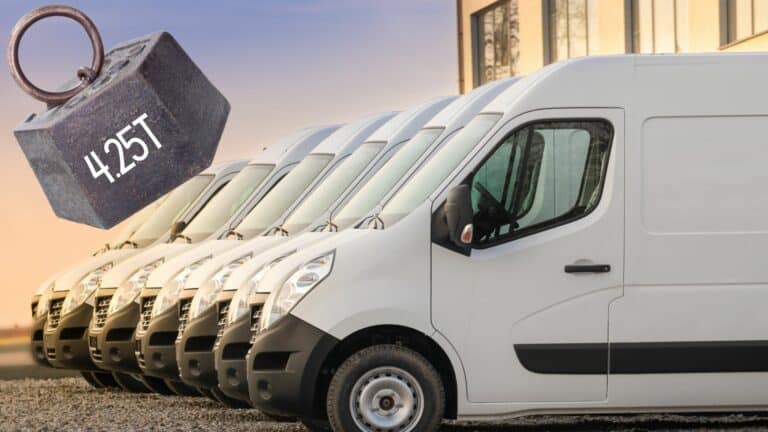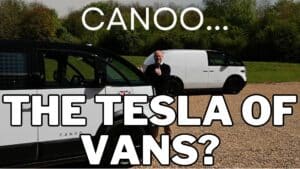There’s a possibility you might get a sense of deja vu when reading this edition of the newsletter, but, I think it’s important that here at EV Essentials we continue to highlight the issues that are causing the electric van market to stall, and that just putting the onus on manufacturers to, in 2024 sell 10% of their output as electric vans isn’t going to work in isolation.
As ever, let’s take a quick look as to how the van market performed in July. Overall, up to 3.5t GVM, there was a fall of 8.5% compared to July 2023, although it should be noted that that month was recognised as a bumper one for registrations. Year to date, the market is up a modest 2.7%. Interestingly, the small, under 2.0t GVM sector has seen a boom with a 42% increase year to date.
Now, to electric vans. Taking July in isolation, it’s good to see that the 5.5% market share is an increase on the 4.3% recorded in July ‘23. We’ve not seen an improvement like this for quite some time. However the number of registrations is down 8.1%, being in line with the whole van market. Year to date, things are not quite as rosy, electric vans showing a market share of 4.8% compared to 5.2% this time last year. However, and it’s a fairly big however…
I’ve highlighted previously that these statistics from the SMMT only reflect EV registrations up to 3.5t GVM, and we all know that most manufacturers are now marketing vans at 4.25t GVM to take advantage of the licence derogation. These units have, up to press from what I can gather have been lumped in with the ‘Rigids – 3.5t to 6.0t’ category so, not counted separately. But, this month, things have changed. There’s a new line in the data, ‘Rigids 3.5t to 4.25t (BEV Only)’. Hooray! We can now see how these heavier vans are performing. It’s not great news. July 2024? Just 47 registrations compared to 168 in July 2023, a 72% drop. And in that period we’ve seen new product from the likes of Mercedes-Benz, and improved vans with longer ranges from others. Year to date the picture is similar, 539 units this year, 742, in ‘23. Just a 0.3% share of the van market.
So, just where are we (or they?) going wrong? Why is the electric van market stalling? In a recent LinkedIn post, I highlighted this stagnation, pointing out that if the market leader Ford can only achieve 1.2% of its July registrations as electric, where does the responsibility lie? I’ve tried to be realistic in saying that electric vans are not for every application right now, but that surely more than 10% of operations could practically, and economically utilise an emission free electric vehicle. It was good to see plenty of responses to the post which, I reckon give a good indication as to how others perceive the issues. Here are just a few snippets that might give a sense of the feeling out there.
Steve Carmen mentions a fuel that, although popular in Europe has yet to make a mark in the UK. ‘Perhaps CNG makes more sense for a larger LCV that covers higher miles as the speed of fuelling and price shouldn’t be much different to a diesel, while electric covers off the needs of back-to-base and primarily urban operators. The good news is that used prices of the older electric vans have come down and are now being snapped up by SMEs whose operational needs match an EV’s capabilities’. Steve H added ‘I feel like a broken record but the Government need to circulate better support in grants to incentivise and encourage not only infrastructure but adoption. The LGV and HGV market has a long way to go.’ Citing the lack of education being offered to potential electric van operators, Roman Przbys said ‘I totally agree the 4.25t topic needs to be addressed and the other valid points raised in the comments. Potential users are put off by change as are most people. As always negative press isn’t helping, but as per the previous comments data is key and the potential savings that customer could have’.
Sarah Medlam offers a great, first hand experience perspective as a user of electric vans for the last 10 years. ‘I think the biggest problem for the small business people is the fear of spending money on something that doesn’t work for their needs. Not only the vehicle but the chargers and understanding all the technology’. Offering a very valid suggestion, she added ‘There really needs to be Government funded hubs where businesses can go and try various vans and talk to knowledgeable, unbiased advisors. Paul Thorley stressed the importance of prospective customers trying an electric van in their own working environment. ‘To me manufacturers need to get bums on seats. Not for an hours test drive but for a realistic working day or maybe two. Daniel Osman cited the lack of incentive for a business to change its habits. ‘What incentive is there for businesses to adapt? Why at the moment change from something that is known to work? Diesel, its easy, and simple and processes are already in place’.
There’s been some further discussion regarding the challenges faced by the fleet sector in particular at a panel debate at a conference recently held by the BVRLA. Rather than reproduce the comments here, Fleet News has put together a summary of the issues discussed, and you can read the article by clicking here.
So there we go – plenty of ideas, suggestions and, still some negativity. Is that pragmatism, or just a glass half empty outlook? Whichever – there needs to be a substantial change in attitudes, and this can only be realised by some sort of action.
Space issues (because I’ve droned on a bit, hopefully justifiably!) mean that I’m not going to do a full breakdown of the manufacturer data supplied by our friends at New Automotive this month but, it’s important to mention a bit of good news – What do Vauxhall, Peugeot, Mercedes-Benz, Toyota and Nissan have in common? Over 10% of their July registrations were of the electric variety. Great news, and looking at year to date performance, Peugeot, Nissan and Maxus are clear of that 10% ZEV Mandate requirement, with Vauxhall in touching distance.




